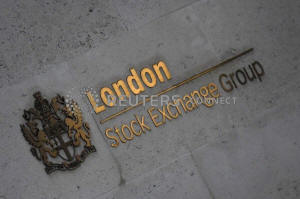|
Trade woes sink shares, Brexit weighs on
sterling
 Send a link to a friend
Send a link to a friend
 [May 23, 2019]
By Marc Jones [May 23, 2019]
By Marc Jones
LONDON (Reuters) - World shares made it
four days in the red in the last five on Thursday as concerns grew that
the China-U.S. trade conflict was fast turning into a technology cold
war between the world's two largest economies.
Asian stocks caved to a four-month low as the rhetoric between Beijing
and Washington remained fierce while Europe's bourses also fell as
Brexit worries and gloomy data from Germany and the euro zone added to
the nerves.
U.S. stock futures also pointed to a weak start with the S&P 500 e-minis
faltering 0.5%.
Investors worry that the U.S.-China trade dispute, which has already
hurt global growth and business investment, could see a further sharp
escalation with no signs of a resolution as yet.
Late Wednesday, Reuters reported the U.S. administration was considering
Huawei-like sanctions on Chinese video surveillance firm Hikvision over
the country's treatment of its Uighur Muslim minority, according to a
person briefed on the matter.

After the United States placed Huawei Technologies on a trade blacklist
last week, British chip designer ARM has halted relations with Huawei in
order to comply with the blockade.
Digging the knife in, the U.S. military said it sent two Navy ships
through the Taiwan Strait on Wednesday.
"It's tin hats on and battening down the hatches for a fair bit of
volatility for the next few months," said Tony Cousins, Chief Executive
of Pyrford International, the global equities arm of BMO Global Asset
Management.
"We are as defensively positioned as we could be," he said, adding it
was impossible to predict what steps U.S. President Donald Trump was
likely to take next in the trade war with China.
An increasing number of investors now seem to be hunkering down for
prolonged period of trade conflict.
Analysts at Nomura warned in a note, "Without a clear way forward during
an intensifying 2020 U.S. presidential election, we see a rising risk
that tariffs will remain in effect through end 2020."
In response, Shanghai blue chips shed 1.7% to be near their lowest since
February. An index of major telecoms firms fell 3.7% as suppliers to
Huawei suffered. MSCI's broadest index of Asia-Pacific shares outside
Japan touched its lowest in four months.
Treasury Secretary Steven Mnuchin said on Wednesday it would be at least
a month before the United States would enact proposed tariffs on $300
billion in Chinese imports as it studies the impact on American
consumers.
The Indian market bucked the global picture Prime Minister Narendra
Modi's party scored a historic victory in the nation's general election
with official data showing Modi's Bharatiya Janata Party (BJP) ahead in
292 of the 542 seats available.
At least 272 seats are needed for a majority in the lower house of
parliament.
[to top of second column]
|

The London Stock Exchange Group offices are seen in the City of
London, Britain, December 29, 2017. REUTERS/Toby Melville

ENDLESS BREXIT
In currencies, constant trade friction saw the safe haven yen in
demand again as the dollar dipped to 110.16 yen and away from the
week's top of 110.67.
The dollar was up fractionally on the euro at $1.1130 and touched a
1-month high on a basket of currencies at 98.235.
Minutes of the U.S. Federal Reserve's last meeting out on Wednesday
underlined its readiness to be patient on policy "for some time"
given the uncertain global outlook.
The chance of a rate cut seemed to diminish as many Fed policy
makers saw recent weakness in inflation as "transitory", though the
latest escalation in the trade war means markets are still wagering
on an eventual easing.
Sterling had troubles of its own as it hit a 4-1/2-month low of
$1.2603 as it suffered its ninth drop in the last 10 days.
British Prime Minister Theresa May came under intense pressure after
her latest Brexit gambit backfired and fueled calls for her to quit.
Prominent Brexit supporter Andrea Leadsom resigned from the
government on Wednesday and with British media reporting May could
announce her departure date as early as Friday the bets on a more
hard Brexit replacement are rising.
"Uncertainty is the only clear certainty in the near term," said
Westpac macro strategist Tim Riddell.
"The risk of a hard-Brexit replacement for May has increased the
risks of a hard Brexit result or even a forced no-deal exit," he
added. "Such an event would likely force GBP lower, increase risks
of assets sliding and BOE (Bank of England) taking counter action to
support assets."

In commodity markets, spot gold was a bit higher at $1,274.73 per
ounce.
Oil prices added to losses suffered overnight after an unexpected
build in U.S. crude inventories compounded investor worries about
demand.
U.S. crude was last down 48 cents at $60.94 a barrel, while Brent
crude futures lost 57 cents to $70.41.
(Additional reporting by Wayne Cole in Sydney; Editing by Raissa
Kasolowsky)
[© 2019 Thomson Reuters. All rights
reserved.]
Copyright 2019 Reuters. All rights reserved. This material may not be published,
broadcast, rewritten or redistributed.
Thompson Reuters is solely responsible for this content. |